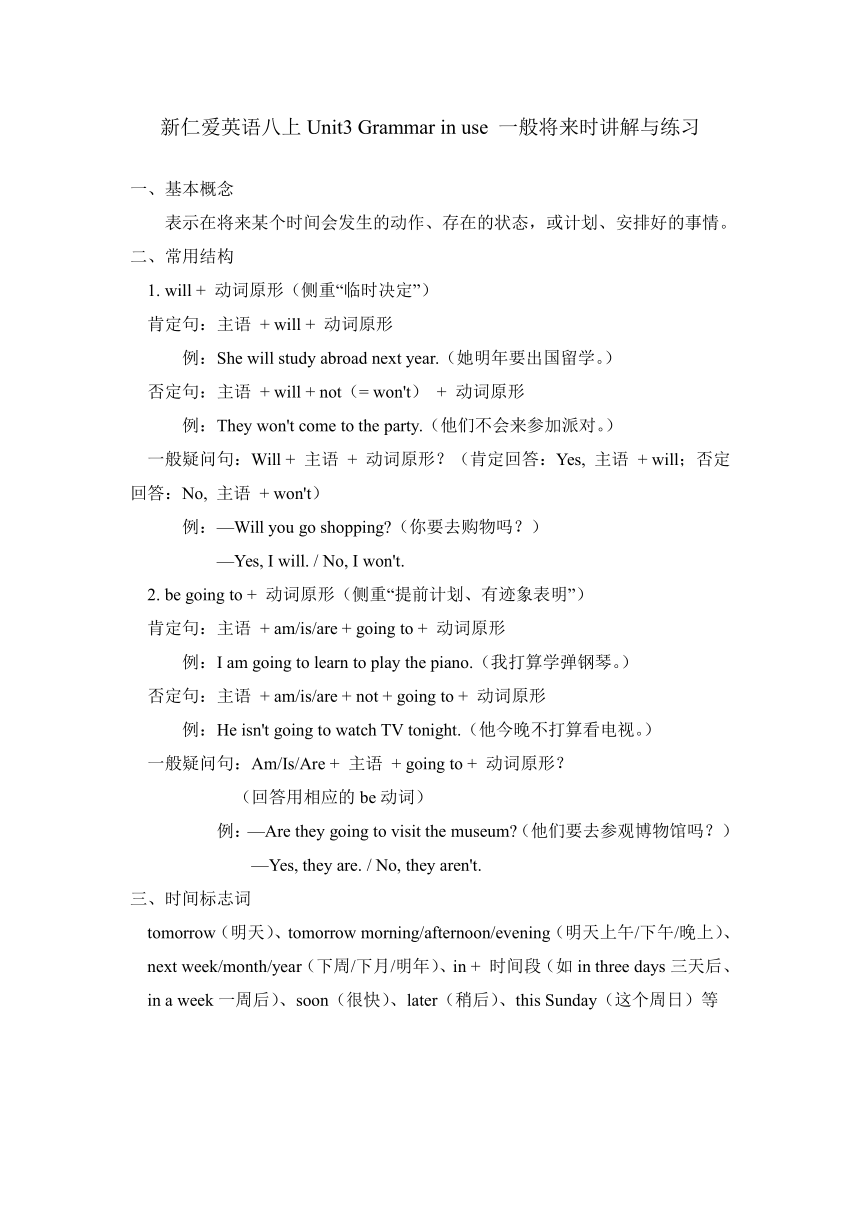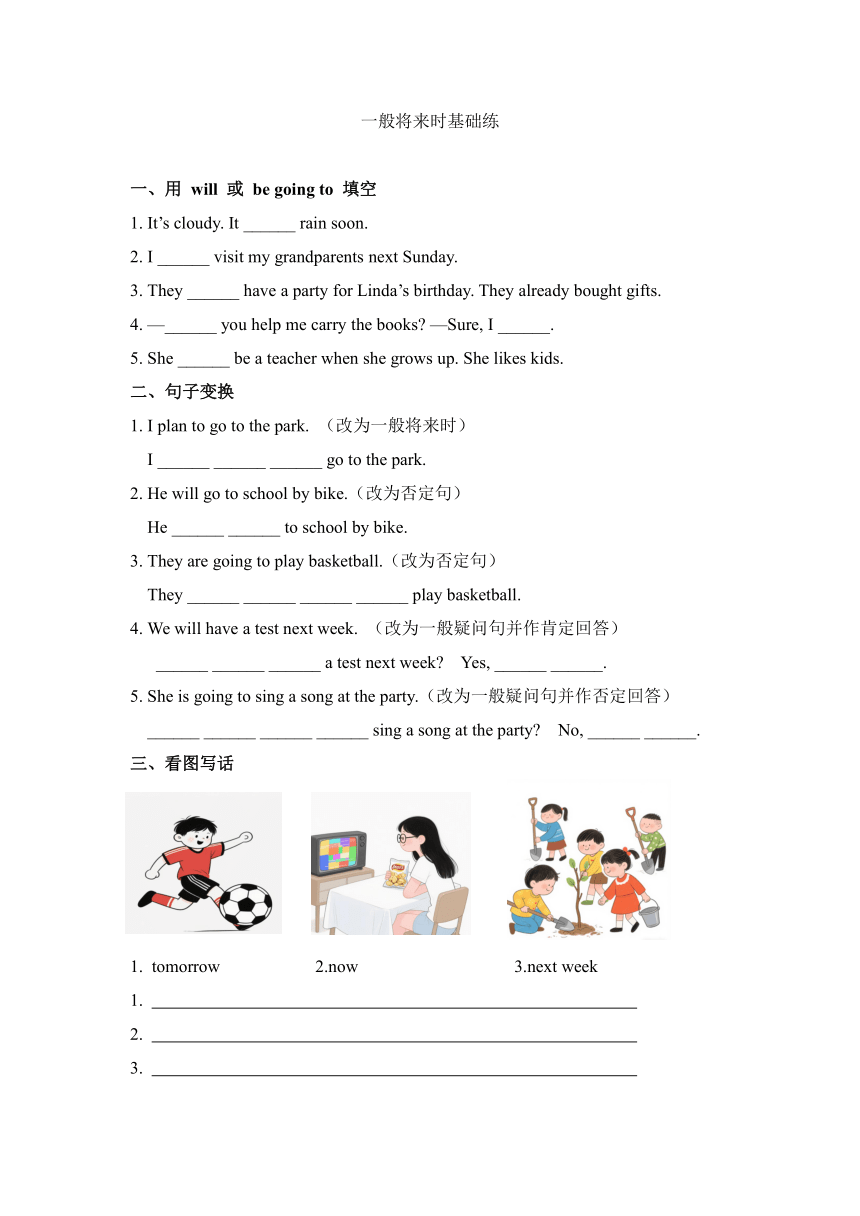Unit 3 Dream Jobs Grammar in use 一般将来时讲解与练习(含答案) 仁爱科普版(2024)八年级上册
文档属性
| 名称 | Unit 3 Dream Jobs Grammar in use 一般将来时讲解与练习(含答案) 仁爱科普版(2024)八年级上册 |  | |
| 格式 | docx | ||
| 文件大小 | 306.4KB | ||
| 资源类型 | 教案 | ||
| 版本资源 | 仁爱科普版 | ||
| 科目 | 英语 | ||
| 更新时间 | 2025-07-24 13:41:51 | ||
图片预览


文档简介
新仁爱英语八上Unit3 Grammar in use 一般将来时讲解与练习
一、基本概念
表示在将来某个时间会发生的动作、存在的状态,或计划、安排好的事情。
二、常用结构
1. will + 动词原形(侧重“临时决定”)
肯定句:主语 + will + 动词原形
例:She will study abroad next year.(她明年要出国留学。)
否定句:主语 + will + not(= won't) + 动词原形
例:They won't come to the party.(他们不会来参加派对。)
一般疑问句:Will + 主语 + 动词原形?(肯定回答:Yes, 主语 + will;否定回答:No, 主语 + won't)
例:—Will you go shopping (你要去购物吗?)
—Yes, I will. / No, I won't.
2. be going to + 动词原形(侧重“提前计划、有迹象表明”)
肯定句:主语 + am/is/are + going to + 动词原形
例:I am going to learn to play the piano.(我打算学弹钢琴。)
否定句:主语 + am/is/are + not + going to + 动词原形
例:He isn't going to watch TV tonight.(他今晚不打算看电视。)
一般疑问句:Am/Is/Are + 主语 + going to + 动词原形?
(回答用相应的be动词)
例:—Are they going to visit the museum (他们要去参观博物馆吗?)
—Yes, they are. / No, they aren't.
三、时间标志词
tomorrow(明天)、tomorrow morning/afternoon/evening(明天上午/下午/晚上)、next week/month/year(下周/下月/明年)、in + 时间段(如in three days三天后、in a week一周后)、soon(很快)、later(稍后)、this Sunday(这个周日)等
一般将来时基础练
一、用 will 或 be going to 填空
1. It’s cloudy. It ______ rain soon.
2. I ______ visit my grandparents next Sunday.
3. They ______ have a party for Linda’s birthday. They already bought gifts.
4. —______ you help me carry the books —Sure, I ______.
5. She ______ be a teacher when she grows up. She likes kids.
二、句子变换
1. I plan to go to the park. (改为一般将来时)
I ______ ______ ______ go to the park.
2. He will go to school by bike.(改为否定句)
He ______ ______ to school by bike.
3. They are going to play basketball.(改为否定句)
They ______ ______ ______ ______ play basketball.
4. We will have a test next week. (改为一般疑问句并作肯定回答)
______ ______ ______ a test next week Yes, ______ ______.
5. She is going to sing a song at the party.(改为一般疑问句并作否定回答)
______ ______ ______ ______ sing a song at the party No, ______ ______.
看图写话
tomorrow 2.now 3.next week
四、阅读理解
Hello, I’m Lily. Tomorrow is Saturday. I have a happy plan! In the morning, I am going to visit my grandparents. They live in a small village. My grandma will make my favorite noodles for lunch. In the afternoon, my cousin Tom and I are going to fly a kite in the park. Tom is good at flying kites. He will teach me some tricks. In the evening, we will watch a funny movie together at my grandparents’ home. I think it will be a great day!
1. What day is it today (今天是星期几?)
It is ______ .
2. What is Lily going to do in the morning
She ______ ______ ______ her grandparents.
3. Who will make noodles for Lily
Her ______ ______ make noodles for her.
4. What are Lily and Tom going to do in the afternoon
They ______ ______ ______ ______ a kite in the park.
5. Will they watch a movie in the evening
______, ______ ______.
参考答案与解析
一、用 will 或 be going to 填空
1. is going to (根据迹象“多云”判断要下雨,用 be going to )
2. will / am going to (单纯表将来,两种结构都可 )
3. are going to (有“已经买礼物”的计划,用 be going to )
4. Will; will (表意愿用 will )
5. is going to (“长大想当老师”是计划、打算,用 be going to )
二、句子变换
1. am going to 2. won’t go 3. are not going to
4. Will you have ;we will 5. Is she going to;she isn’t
三、看图写话
1. The boy will /is going to play football tomorrow.
2. The girl is watching TV now.
3. The children will/ are going to plant trees next week.
四、阅读理解
1. Friday
解析:文中 “Tomorrow is Saturday.(明天是周六)”,所以今天是周五。
2. is going to visit
解析:文中 “In the morning, I am going to visit my grandparents.(早上我打算去看望祖父母)”,直接提取 “is going to visit” 。
3. grandma will
解析:文中 “My grandma will make my favorite noodles for lunch.(我奶奶会做我最爱的面条当午餐)”,提取 “grandma will” 。
4. are going to fly
解析:文中 “In the afternoon, my cousin Tom and I are going to fly a kite in the park.(下午我和表弟汤姆打算去公园放风筝)”,提取 “are going to fly” 。
5. Yes, they will
解析:文中 “In the evening, we will watch a funny movie together...(晚上我们会一起看有趣的电影……)”,所以做肯定回答 Yes, they will 。)
一、基本概念
表示在将来某个时间会发生的动作、存在的状态,或计划、安排好的事情。
二、常用结构
1. will + 动词原形(侧重“临时决定”)
肯定句:主语 + will + 动词原形
例:She will study abroad next year.(她明年要出国留学。)
否定句:主语 + will + not(= won't) + 动词原形
例:They won't come to the party.(他们不会来参加派对。)
一般疑问句:Will + 主语 + 动词原形?(肯定回答:Yes, 主语 + will;否定回答:No, 主语 + won't)
例:—Will you go shopping (你要去购物吗?)
—Yes, I will. / No, I won't.
2. be going to + 动词原形(侧重“提前计划、有迹象表明”)
肯定句:主语 + am/is/are + going to + 动词原形
例:I am going to learn to play the piano.(我打算学弹钢琴。)
否定句:主语 + am/is/are + not + going to + 动词原形
例:He isn't going to watch TV tonight.(他今晚不打算看电视。)
一般疑问句:Am/Is/Are + 主语 + going to + 动词原形?
(回答用相应的be动词)
例:—Are they going to visit the museum (他们要去参观博物馆吗?)
—Yes, they are. / No, they aren't.
三、时间标志词
tomorrow(明天)、tomorrow morning/afternoon/evening(明天上午/下午/晚上)、next week/month/year(下周/下月/明年)、in + 时间段(如in three days三天后、in a week一周后)、soon(很快)、later(稍后)、this Sunday(这个周日)等
一般将来时基础练
一、用 will 或 be going to 填空
1. It’s cloudy. It ______ rain soon.
2. I ______ visit my grandparents next Sunday.
3. They ______ have a party for Linda’s birthday. They already bought gifts.
4. —______ you help me carry the books —Sure, I ______.
5. She ______ be a teacher when she grows up. She likes kids.
二、句子变换
1. I plan to go to the park. (改为一般将来时)
I ______ ______ ______ go to the park.
2. He will go to school by bike.(改为否定句)
He ______ ______ to school by bike.
3. They are going to play basketball.(改为否定句)
They ______ ______ ______ ______ play basketball.
4. We will have a test next week. (改为一般疑问句并作肯定回答)
______ ______ ______ a test next week Yes, ______ ______.
5. She is going to sing a song at the party.(改为一般疑问句并作否定回答)
______ ______ ______ ______ sing a song at the party No, ______ ______.
看图写话
tomorrow 2.now 3.next week
四、阅读理解
Hello, I’m Lily. Tomorrow is Saturday. I have a happy plan! In the morning, I am going to visit my grandparents. They live in a small village. My grandma will make my favorite noodles for lunch. In the afternoon, my cousin Tom and I are going to fly a kite in the park. Tom is good at flying kites. He will teach me some tricks. In the evening, we will watch a funny movie together at my grandparents’ home. I think it will be a great day!
1. What day is it today (今天是星期几?)
It is ______ .
2. What is Lily going to do in the morning
She ______ ______ ______ her grandparents.
3. Who will make noodles for Lily
Her ______ ______ make noodles for her.
4. What are Lily and Tom going to do in the afternoon
They ______ ______ ______ ______ a kite in the park.
5. Will they watch a movie in the evening
______, ______ ______.
参考答案与解析
一、用 will 或 be going to 填空
1. is going to (根据迹象“多云”判断要下雨,用 be going to )
2. will / am going to (单纯表将来,两种结构都可 )
3. are going to (有“已经买礼物”的计划,用 be going to )
4. Will; will (表意愿用 will )
5. is going to (“长大想当老师”是计划、打算,用 be going to )
二、句子变换
1. am going to 2. won’t go 3. are not going to
4. Will you have ;we will 5. Is she going to;she isn’t
三、看图写话
1. The boy will /is going to play football tomorrow.
2. The girl is watching TV now.
3. The children will/ are going to plant trees next week.
四、阅读理解
1. Friday
解析:文中 “Tomorrow is Saturday.(明天是周六)”,所以今天是周五。
2. is going to visit
解析:文中 “In the morning, I am going to visit my grandparents.(早上我打算去看望祖父母)”,直接提取 “is going to visit” 。
3. grandma will
解析:文中 “My grandma will make my favorite noodles for lunch.(我奶奶会做我最爱的面条当午餐)”,提取 “grandma will” 。
4. are going to fly
解析:文中 “In the afternoon, my cousin Tom and I are going to fly a kite in the park.(下午我和表弟汤姆打算去公园放风筝)”,提取 “are going to fly” 。
5. Yes, they will
解析:文中 “In the evening, we will watch a funny movie together...(晚上我们会一起看有趣的电影……)”,所以做肯定回答 Yes, they will 。)
同课章节目录
